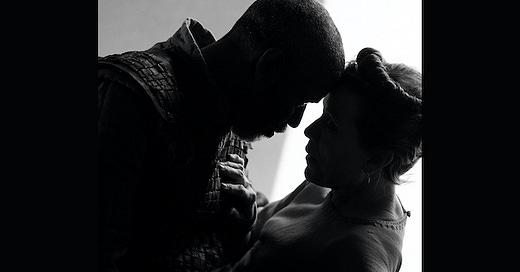ReelBob: ‘The Tragedy of Macbeth’ ★★★★
Joel Coen's film-noir adaptation of Shakespeare's tragedy is bleak, oppressive and complemented by strong performances by Denzel Washington and Frances McDormand.
“The Tragedy of Macbeth” is part homage to Orson Welles, accentuated by impressionistic and expressionistic production design and black-and-white cinematography.
The movie, adapted from Shakespeare’s play and directed by Joel Coen, is stark and cloistered. The sun is always obscured by clouds and smoke, corridors are long and narrow, supported by high, thick columns.
Coen has created an oppressive movie that is intentionally quiet and intimate. The vast majority of sequences involve either a solitary figure or two people, talking “sotto voce” — especially the exchanges between Macbeth (Denzel Washington) and Lady Macbeth (Frances McDormand).
Casting these two multiple Academy Award-winners as the ambitious Scottish couple is a stroke of genius.
Washington has gone dark before, most notably in his Oscar-winning performance in “Training Day.”
McDormand’s cinematic persona is usually more congenial, most notably in “Fargo” and last year’s “Nomadland.” She, though, also is capable of sparks of rage as in “Three Billboards Outside Ebbing, Missouri.”
Coen’s movie emphasizes mood and staging. It is limited to its own small world, and the director heightens an atmosphere in which we know that “something wicked this way comes.” Light must fight its way onto the screen. This airless version of the tragedy, at 105 minutes, cuts Shakespeare’s work to its core.
This minimalist production of the Scottish play uses props and sets that are very basic.
Bruno Delbonnel’s cinematography amplifies the stifling feeling of dread and death that surrounds the entire film like a thick London fog.
Delbonnel’s cinematography, like that of John L. Russell’s for Welles’ 1948 film, emphasizes tone over spectacle. The major difference — Welles was working on a limited budget because his “Macbeth” was being produced by B-movie studio Republic Pictures, best known for its Roy Rogers Westerns and serials.
Coen takes a moderated approach; big moments are few and far between. Outbursts of emotion are infrequent.
If there’s a driving force, it is the performance of Kathryn Hunter, who, in portraying the three witches who prophesize Macbeth’s destiny, sets him on his fatal course.
Washington is a more cerebral Macbeth, using cunning and guile over brawn. At first, he is skeptical, but after the first prophesy rings true, Macbeth’s moral compass begins to collapse and ambition grows in his mind.
McDormand is the instigator who pushes her husband to grab his future by any means necessary. But as her husband’s ambition grows, his attention to her wane, which, along with the weight of the couple’s foul deeds, ignites her journey to madness and death.
Coen has created a film-noir Macbeth, steeped in bleak atmosphere and crushing composition.
“The Tragedy of Macbeth” has been filmed many times — and in many guises — but none has risen to the level of preordained doom as Coen’s incarnation.
I am a founding member of the Indiana Film Journalists Association. I review movies, 4K UHD, Blu-rays and DVDs for ReelBob (ReelBob.com), The Film Yap substack and other print and online publications. I can be reached by email at bobbloomjc@gmail.com. You also can follow me on Twitter @ReelBobBloom and on Facebook at ReelBob.com or the Indiana Film Journalists Association. My movie reviews also can be found at Rotten Tomatoes: www.rottentomatoes.com.
THE TRAGEDY OF MACBETH
4 stars out of 4
(R), violence




